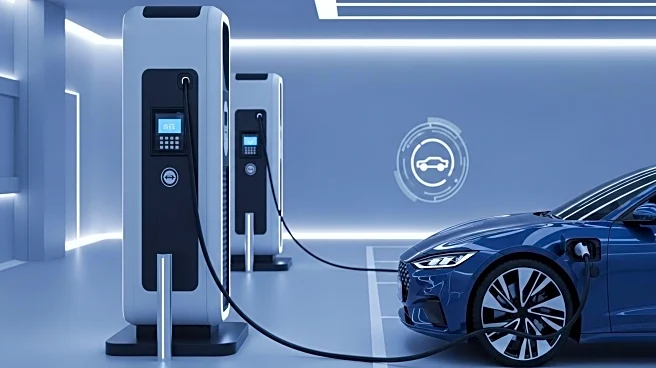What is the story about?
What's Happening?
Cox Automotive has projected a 6% year-over-year increase in new-vehicle sales for September, with the seasonally adjusted selling rate expected to reach 16.2 million units. This marks an improvement from last year's 15.8 million and a slight rise from August's 16.1 million. The increase is attributed to a resilient market overcoming policy changes and economic uncertainties. A significant factor driving sales is the surge in electric vehicle (EV) purchases, spurred by the impending expiration of the $7,500 federal tax credit. Cox Automotive forecasts a record 410,000 EVs sold in the third quarter, representing a 21.1% increase from the previous year and a 30% rise from the second quarter. The share of EV sales is anticipated to reach nearly 10% of total sales, setting a new record.
Why It's Important?
The forecasted increase in new-vehicle sales, particularly in the EV sector, highlights a pivotal moment for the automotive industry. The expiration of federal tax credits for EVs could test the market's maturity and its ability to sustain growth without government incentives. This development is crucial for automakers, especially the 'Big Four'—General Motors, Toyota, Ford, and Hyundai—who are expected to drive the majority of sales gains. The shift towards electric vehicles reflects broader trends in consumer preferences and environmental considerations, potentially influencing future policy decisions and industry strategies. The anticipated slowdown in EV sales post-tax credit expiration could impact automakers' production and marketing strategies.
What's Next?
Cox Automotive anticipates a decline in EV sales in the fourth quarter as the tax credit expires, challenging the market to sustain growth independently. The company has adjusted its full-year sales forecast to between 15.8 and 16.4 million units, with a baseline of 16.1 million. The forecast for fleet and new retail sales has been increased, while EV leasing is expected to decline. Automakers may face higher import costs due to tariffed products, potentially leading to increased vehicle prices. The industry will need to navigate these challenges while maintaining consumer interest and adapting to changing market conditions.
Beyond the Headlines
The expiration of EV tax credits raises questions about the long-term sustainability of electric vehicle adoption. As government incentives diminish, the industry must rely on technological advancements and consumer demand to drive growth. This transition could influence automakers' investment in EV technology and infrastructure, as well as their approach to marketing and consumer engagement. The broader implications for environmental policy and energy consumption are significant, as the shift towards electric vehicles plays a crucial role in reducing carbon emissions and promoting sustainable transportation solutions.
















